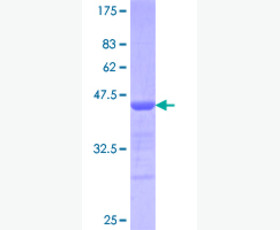Recombinant Human Mucin-1/MUC-1
| Product name: | Recombinant Human Mucin-1/MUC-1 |
| Source: | Human Cells |
| Purity: | Greater than 90% as determined by reducing SDS-PAGE. |
| Buffer Formulation: | Lyophilized from a 0.2 μm filtered solution of PBS, pH7.4. |
| Applications: | Applications:SDS-PAGE; WB; ELISA; IP. |
| Storage: | Avoid repeated freeze/thaw cycles. Store at 2-8 oC for one month. Aliquot and store at -80 oC for 12 months. |
| UOM: | 100ug/50ug/200ug/1mg/1g |
| Source | Human Cells |
| Description | Recombinant Human Mucin-1 is produced by our Mammalian expression system and the target gene encoding Ala23-Gly167 is expressed with a Fc tag at the C-terminus. |
| Names | Mucin-1; MUC-1; Breast carcinoma-associated antigen DF3; Cancer antigen 15-3; CA 15-3; Carcinoma-associated mucin; Episialin; H23AG; Krebs von den Lungen-6; KL-6; PEMT; Peanut-reactive urinary mucin; PUM; Polymorphic epithelial mucin; PEM; Tumor-associated epithelial membrane antigen; EMA; Tumor-associated mucin; CD227; MUC1 |
| Accession # | P15941-11 |
| Formulation | Lyophilized from a 0.2 μm filtered solution of PBS, pH7.4. |
| Shipping |
The product is shipped at ambient temperature. |
| Reconstitution |
Always centrifuge tubes before opening. Do not mix by vortex or pipetting. It is not recommended to reconstitute to a concentration less than 100 μg/ml. Dissolve the lyophilized protein in ddH2O. Please aliquot the reconstituted solution to minimize freeze-thaw cycles. |
| Storage |
Lyophilized protein should be stored at < -20°C, though stable at room temperature for 3 weeks. Reconstituted protein solution can be stored at 4-7°C for 2-7 days. Aliquots of reconstituted samples are stable at < -20°C for 3 months. |
| Purity |
Greater than 90% as determined by reducing SDS-PAGE. |
| Endotoxin | Less than 0.1 ng/µg (1 IEU/µg) as determined by LAL test. |
| Amino Acid Sequence |
APKPATVVTGSGHASSTPGGEKETSATQRSSVPSSTEKNAFNSSLEDPSTDYYQELQRDISEMFL QIYKQGGFLGLSNIKFRPGSVVVQLTLAFREGTINVHDVETQFNQYKTEAASRYNLTISDVSVSD VPFPFSAQSGAGVPGDIEGRMDPKSCDKTHTCPPCPAPELLGGPSVFLFPPKPKDTLMISRTPEV TCVVVDVSHEDPEVKFNWYVDGVEVHNAKTKPREEQYNSTYRVVSVLTVLHQDWLNGKEYKCKVS NKALPAPIEKTISKAKGQPREPQVYTLPPSRDELTKNQVSLTCLVKGFYPSDIAVEWESNGQPEN NYKTTPPVLDSDGSFFLYSKLTVDKSRWQQGNVFSCSVMHEALHNHYTQKSLSLSPGK
|
| Background | Mucin-1, is a membrane-bound protein that is a member of the mucin family. Mucins are O-glycosylated proteins that play an essential role in forming protective mucous barriers on epithelial surfaces. These proteins also play a role in intracellular signaling. This protein is expressed on the apical surface of epithelial cells that line the mucosal surfaces of many different tissues including lung, breast stomach and pancreas. MUC-1 exclusively located in the apical domain of the plasma membrane of highly polarized epithelial cells. MUC-1 can act both as an adhesion and an anti-adhesion protein. This protein may provide a protective layer on epithelial cells against bacterial and enzyme attack. MUC-1 participated in modulates signaling in ERK, SRC and NF-kappa-B pathways. In activated T-cells, MUC-1 influences directly or indirectly the Ras/MAPK pathway. MUC-1 promotes tumor progression and regulates TP53-mediated transcription and determines cell fate in the genotoxic stress response. |














